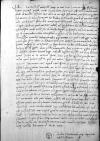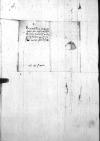Incredibilem voluptatem accepi ex tuis tam humanis tamque festivis cf. Ioannes DANTISCUS to Karel UUTENHOVE shortly before 1532-01-19, CIDTC IDL 7017, letter lost⌊litteriscf. Ioannes DANTISCUS to Karel UUTENHOVE shortly before 1532-01-19, CIDTC IDL 7017, letter lost⌋, ornatissime Praesul. Certe humaniores fuere, quam quae mihi a tanto viro scribi debuerant, festivae ms. es(!)
⌈aeae ms. es(!)
⌉ vero adeo, ut nec ipsa festivitas potuisset excogitare festiviores. Si vera sunt, quae de Iacobus Robbius Aldenardus a scribe, probably employed at the Council of Flanders, possibly also a secretary of Karel Uutenhove⌊RobbioIacobus Robbius Aldenardus a scribe, probably employed at the Council of Flanders, possibly also a secretary of Karel Uutenhove⌋ nostro audio, quod non omnino diffici ms. e(!)
⌈ii ms. e(!)
⌉le crediderim, felix est nimium, inquam, felix, quod uxor eius non resciverit, alioqui audiret, quod minime vellet, nam ego arbitror illam minime mutam esse. Ostendisset, mihi crede, sibi non deesse linguam ac fortassis etiam nec manus, at ego tum optarim vultus illius contemplari ac gestus, dum ita tractaretur.
cf. Ter. Eu. Chaeream, qiium qui eunuchum induerat ⌊Nimirum Chaeream, illum superinscribed, in the hand of sender⌈illumillum superinscribed, in the hand of sender⌉, qui eunuchum indueratcf. Ter. Eu. Chaeream, qiium qui eunuchum induerat ⌋, nobis exprimeret. Scis, quid is nunc agat? Iactat cyathos, quos istic ebibit et de ms. i(!)
⌈ee ms. i(!)
⌉licatos bolos, quos voravit, ac tuo munusculo superbus nusquam se non ostentat. Iis superioribus diebus celebravimus Dyonisia, sed quae ille tum egerit, nemo pictor, nemo poeta satis exprimere possit. Quae si vidisses, iurares hominem magis ri ms. e(!)
⌈ii ms. e(!)
⌉diculum reperiri non posse. Sed de illo hactenus.
Quod scribis, ut te certiorem facerem de his, quae hic aguntur, prorsus non video, quid scribere possim, quam nos valere, suaviter vivere ac tui haud quaquam immemores esse. Quod tuum officium ac, quacumque in re possis, auxilium offers, habeo gratias immortales nec video, quid umquam dignum tam immodica tua erga me benevolentia praestare possim. Hoc quod autem, quod vel imprimis tibi gratum fore arbitror, faciam, te dum vivam amabo, colam, venerabor.
Qui has ad te fert, est mihi sanguinitate coniunctus, Franciscus Uutenhove ⌊Francisco UtenoveoFranciscus Uutenhove ⌋ huic nomen est. Franciscus Uutenhove ⌊QuiFranciscus Uutenhove ⌋ vehementer cupit per me tibi commendari ac peroptaret, si tibi commodum esset, tuae familiae adscribi tecumque in Poland (Kingdom of Poland, Polonia)⌊PoloniamPoland (Kingdom of Poland, Polonia)⌋ proficisci. Franciscus Uutenhove ⌊IuvenisFranciscus Uutenhove ⌋, ut arbitror, non omnino ineleganti ingenio est, at nonnihil feroculus fide tali, ut pro illo non dubitarem meam opponere. Si videas Franciscus Uutenhove ⌊illumFranciscus Uutenhove ⌋, ubi for stain⌈[r]r stain⌉te in Poland (Kingdom of Poland, Polonia)⌊PoloniamPoland (Kingdom of Poland, Polonia)⌋ perveneris, tibi parum idoneum, commoda illum, quaeso, alicui bono domino. Si id effi ms. e(!)
⌈ii ms. e(!)
⌉cere poteris, me tibi plurimum devinxeris, quamvis iamdudum tibi sim sane devictissimus. Certe verebar nonnihil hac commendatione tibi molestus esse, sed istis persuasum est me tantum apud te valere, ut plane puderit abnuere.
Vale.
Dominus Willem de Waele (Gulielmus à Wala), Lord of Hansbeke, a prominent citizen of Ghent (ALLEN, 2, p. 6)⌊Gulielmus a WaleWillem de Waele (Gulielmus à Wala), Lord of Hansbeke, a prominent citizen of Ghent (ALLEN, 2, p. 6)⌋, dominus Omaar van Edingen (Audomarus Edingus) (*ca. 1488 – †1540), clerk (griffarius) to the Council of Flanders (CE, vol. I, p. 420)⌊scribaOmaar van Edingen (Audomarus Edingus) (*ca. 1488 – †1540), clerk (griffarius) to the Council of Flanders (CE, vol. I, p. 420)⌋ et soror nostra Iodoca, sister of Karel UUTENHOVE ⌊IodocaIodoca, sister of Karel UUTENHOVE ⌋ commendant se tibi plurimum. Si qui istic sunt, qui Utenhovium norunt, quaeso, ut et illis commendatus sim.
Rursus vale Ioannes Dantiscus (Johannes von Höfen, Ioannes de Curiis, Jan Dantyszek, Johannes Flachsbinder) (*1485 – †1548), eminent diplomat and humanist in the service of the Jagiellons, neo-Latin poet; 1530-1537 Bishop of Kulm; 1537-1548 Bishop of Ermland⌊DantisceIoannes Dantiscus (Johannes von Höfen, Ioannes de Curiis, Jan Dantyszek, Johannes Flachsbinder) (*1485 – †1548), eminent diplomat and humanist in the service of the Jagiellons, neo-Latin poet; 1530-1537 Bishop of Kulm; 1537-1548 Bishop of Ermland⌋, Maecenas (Gaius Cilnius Maecenas) (*70 BC – †8 BC)⌊MaecenasMaecenas (Gaius Cilnius Maecenas) (*70 BC – †8 BC)⌋ huius temporis.


 BCz, 247, p. 96
BCz, 247, p. 96